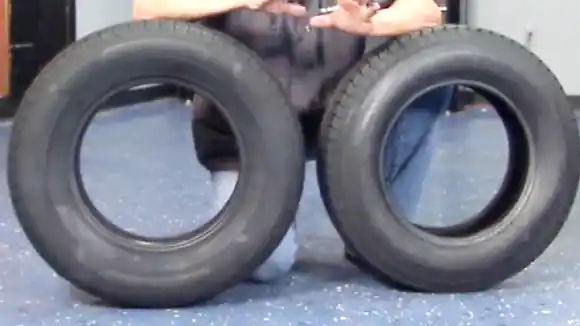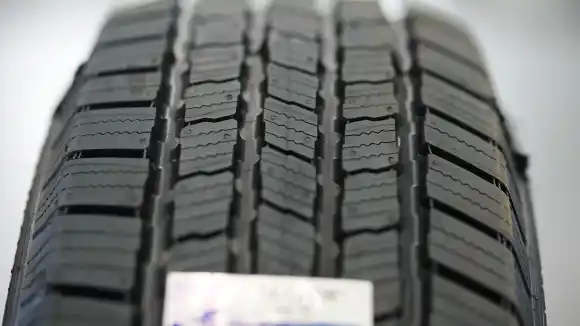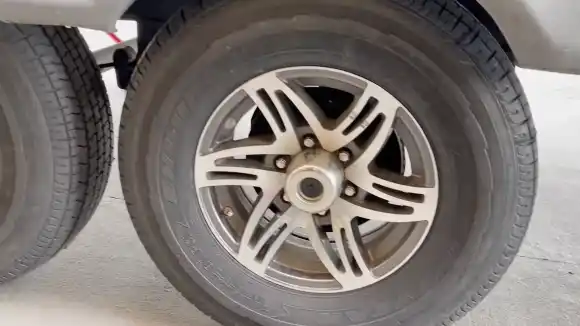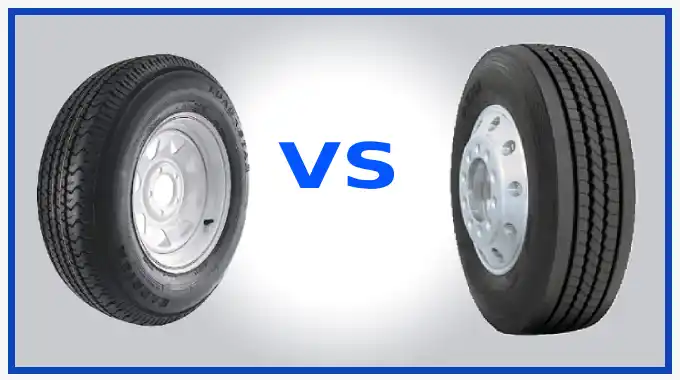Last Updated on July 24, 2023
When shopping for new trailer tires, you’re likely wondering whether to go with 14 or 15-inch options. The decision can be complicated, as various factors must be considered before purchasing. But understanding the differences between the two sizes can help you make an informed decision that fits your needs.
One of the biggest factors to consider is tire ratings and construction, which can impact your tires’ overall durability and performance. Load capacity is another key consideration, as larger tires will typically be able to handle heavier loads.
Today we’ll explore the key differences between 14 and 15-inch trailer tires, including whether they’re interchangeable, which size is better for trailers, and how much weight each size can handle. So, let’s discuss and get you up to speed on all the technical details.
Key Differences Between 14 vs 15 Trailer Tires

To upgrade your trailer tires, you should understand the key distinction between 14 and 15-inch options:
- Tire Ratings and Construction
- Load Capacity
- Handling and Ride Comfort
- Clearance and Height
- Braking System
- Bolt Pattern and Rim Size
- Original Equipment and Long-Term Reliability
- Price Range
Tire Ratings and Construction:
The tire rating system divides trailer tires into groups, with Group D encompassing 14-inch tires and Group E covering 15-inch tires. Selecting a tire with an appropriate load rating is crucial to ensure the safe transportation of heavy loads, making paying attention to the tire size and rating imperative.
Load Capacity:
You may want to consider the load carrying capacity of your trailer tires, as it can affect your vehicle’s overall performance and safety on the road.
15-inch trailer tires generally have a higher load capacity than 14-inch tires. This means that you can carry more weight with 15-inch tires, making them a better choice for heavy-duty trailers or those that carry a lot of cargo.
Regarding load capacity, note that exceeding the maximum weight limit specified by the tire manufacturer can lead to tire failure or even a blowout, which can be dangerous and costly. Therefore, you should always ensure that the load capacity of your trailer tires matches the weight of your cargo.
Handling and Ride Comfort:
For a smoother and more stable towing experience, consider upgrading to 15-inch trailer tires with stiffer sidewalls and better road grip. The larger size of these tires can help with handling and stability, particularly when carrying heavy loads.
Also, the stiffer sidewalls of 15-inch tires can provide more support and prevent the trailer from swaying or bouncing on the road. Regarding ride comfort, 14-inch tires may provide a smoother ride due to their softer sidewalls.
However, upgrading to 15-inch trailer tires can still provide a comfortable ride while offering better stability and handling. This can be especially beneficial in adverse weather conditions where a better road grip can significantly affect safety.
Clearance and Height:
To improve your trailer’s clearance and reduce the risk of damage from rough roads, consider upgrading to 15-inch tires and rims. The larger tires will raise the height of your trailer, providing a small increase in clearance that can come in handy when navigating uneven terrains.
This added clearance will also reduce the potential for damage from bottoming out, a common problem with trailers with lower clearance. But before making the switch, it’s important to ensure that your wheel wells have adequate clearance for the larger tires.
If your current tires are already close to the wheel wells, switching to 15-inch tires could cause rubbing and potential damage to your trailer. Take the time to measure the distance between your current tires and the wheel wells to determine if the upgrade is feasible.
Braking System:
With larger 15” tires, you have the potential to accommodate larger 12-inch drum brakes, which can significantly improve your trailer’s braking performance. Having larger brakes means increased stopping power, allowing you to stop your trailer more quickly and efficiently.
This not only improves the safety of your trailer but it also gives you greater control over your towing experience. With improved braking performance, you can navigate steep hills and winding roads more easily and confidently.
Bolt Pattern and Rim Size:
Don’t forget you’ll want to double-check that your chosen trailer tires’ bolt pattern and rim size are compatible with your hub and wheel assembly. Ensure that the bolt pattern matches the hub, which is the part that attaches the wheel to the axle.
The rim size, or diameter of the wheel, is also a crucial factor in compatibility. Choosing the right size can result in good performance and safety issues. If you’re considering upgrading to 15-inch trailer tires, it’s important to note that not all trailers can accommodate this size.
Also, larger tires may require a different braking system to ensure optimal performance. Before making any changes, consult a trusted mechanic or trailer dealer who can advise you on the best options for your specific trailer.
Original Equipment and Long-Term Reliability:

Despite some concerns about the reliability of certain 14-inch tires, many users have successfully used them for long trips without any issues. These tires come as original equipment on many trailers and have proven dependable for most users.
However, note that tire reliability can vary based on the brand and model of the tire, as well as the conditions in which they are used. That being said, it’s recommended that you research and choose a reputable brand and model of tire for your trailer.
This will increase the chances of having a safe and reliable trip without any issues. Also, regular maintenance and inspection of your tires can help prevent any potential problems while on the road.
Price Range:
You may notice a difference in cost between 14-inch and 15-inch tires when shopping for your trailer. The latter is typically more expensive due to its larger size and potential load capacity.
The price range for 15-inch trailer tires can vary depending on factors such as brand, quality, and materials used in manufacturing. Remember that while 15-inch tires may come with a higher price tag, they can offer better performance and longevity than their smaller counterparts.
Investing in high-quality 15-inch trailer tires can save you money in the long run by reducing the need for frequent replacements and repairs. Also, the added load capacity of 15-inch tires can benefit those who frequently haul heavy loads or travel on rough terrain.
What is the primary difference between 14 and 15 tires?
The biggest difference between 14 and 15 tires is their size and circumference. As per the background information, 14′ wheels with legal tires (205/55) have a circumference 8/10 of 1% shorter than the 205/50/15s.
This difference in size affects the overall performance of the tires, including their speed, handling, stability, and fuel efficiency. Here are some factors to consider when choosing between 14 and 15 trailer tires:
- Size and weight capacity: 15 trailer tires are generally larger and have a higher weight capacity than 14 tires, making them suitable for heavy-duty trailers or vehicles.
- Cost and availability: 14 trailer tires may be more affordable and easier to find in some areas, while 15 tires may have a wider selection and better quality options.
- Driving conditions: If you frequently drive on rough or uneven terrain, 15 trailer tires may provide better stability and control than 14 tires.
- Compatibility: Always ensure the tires you choose are compatible with your trailer or vehicle’s specifications and requirements, including the load index, speed rating, and rim size.
Are 14 and 15 tires interchangeable?
If you’re considering switching from a 14-inch tire to a 15-inch tire, it’s important to ensure that the new wheel has the same bolt pattern and enough space to fit the larger wheel and tire. While it is possible to make the switch, you should be aware of some differences between the two tire sizes.
One key difference is the size of the tire itself. A 15-inch tire will have a larger overall diameter than a 14-inch tire, affecting your vehicle’s speedometer accuracy.
Also, a larger tire may have a higher load rating, which means it can carry more weight than a smaller tire. However, a larger tire may also be more expensive and may not provide as smooth a ride as a smaller one. Weigh these factors when deciding whether to switch to a 15-inch tire.
| Aspect | 14-inch tire | 15-inch tire |
| Overall Diameter | Smaller | Larger |
| Load Rating | Lower | Higher |
| Cost | Lower | Higher |
| Ride Comfort | Smoother | Rougher |
Are bigger 15″ tires better for trailers?
While it’s true that larger diameter tires offer increased weight capacity, it’s important to consider the overall impact on your trailer’s performance and safety. Bigger tires also come with a higher price tag. They may need to provide the benefits you’re looking for.
It’s important to note that the increased weight capacity of larger tires is only sometimes necessary for all trailers. If your trailer is already within the weight limit of its current tires, upgrading to bigger tires may not be worth the cost and potential drawbacks.
Also, larger tires may affect your trailer’s maneuverability and stability, especially if they must be properly matched to its weight and size. Therefore, consult a professional and consider all factors before changing your trailer’s tires.
How much weight can a 14-inch trailer tire hold?

With a tire pressure of 50 psi, a 14-inch range tire can handle a load of about 1,700 pounds per tire. This is an important factor to consider when determining the weight capacity of your trailer.
Here are 4 important things to keep in mind when using 14-inch trailer tires:
- Check the load capacity of your trailer and ensure that it is within the maximum load capacity of the tires. Overloading the tires can cause tire failure and lead to dangerous situations on the road.
- Regularly check the tire pressure of your 14-inch trailer tires to ensure they’re properly inflated. Underinflated tires can cause excess heat buildup and tire failure, while overinflated tires can cause a rough ride and increase the risk of blowouts.
- Check the condition of your 14-inch trailer tires before every trip to ensure no signs of wear and tear, such as cracks, punctures, or bulges. Damaged tires can lead to tire failure and cause accidents on the road.
- Consider upgrading to a higher load range tire if your trailer requires a higher weight capacity. This will ensure that your trailer is properly equipped to handle the weight of your cargo and reduce the risk of tire failure on the road.
Why do trailer tires wear out so fast?
Trailer tire wear can be rapid and uneven due to several factors. One of the most common causes of tire wear is incorrect tire pressure.
You should check your tires’ pressure frequently and ensure they’re inflated to the recommended level. Riding with too little or too much air in your tires can cause uneven wear, leading to a shorter lifespan of the tires.
Another factor that can contribute to rapid tire wear is exceeding the load capacity of your tires. Overloading your trailer puts significant stress on your tires, causing them to wear out more quickly. You need to know the weight limit of your trailer and ensure that you’re staying within it.
Trailer misalignment or damage from road debris, such as hitting curbs or potholes, can also cause rapid tire wear. Regular maintenance and inspection of your trailer can help prevent these issues and extend the life of your tires.
How many years are 14″ and 15″ trailer tires good for?
You may be surprised to learn that the average lifespan of 14′ and 15′ trailer tires is only about five years, meaning you may need to replace them sooner than you think. It’s a combination of factors, including the weight and distribution of the load on the trailer, the speed and distance traveled, and the frequency of use and maintenance.
To ensure that your trailer tires last as long as possible, here are three important things to keep in mind:
1) Always inspect your tires before each trip, checking for any signs of wear or damage.
2) Maintain proper tire pressure, as underinflated or overinflated tires can cause uneven wear and decrease lifespan.
3) Avoid overloading your trailer, as this can put too much weight on the tires and cause them to wear out faster.
14-inch or 15-inch Trailer Tires: Choose the Best Tire Size for Your Trailer
When choosing between 14-inch and 15-inch trailer tires, you must consider factors such as load capacity, handling, ride comfort, price, and compatibility with your trailer. While 14-inch tires may offer a smoother ride, 15-inch tires offer higher load capacities and potentially better stability.
Consulting a professional or referring to your trailer’s owner’s manual can help you decide based on your needs and requirements. Remember, the primary difference between the two is their size, and while they’re interchangeable, bigger 15′ tires are generally better for trailers due to their higher load capacity.Like a marathon runner needs the right shoes to run a race, a trailer needs the right tires to function properly. So, choose wisely and with care. Remember the factors that affect tire wear and always adhere to safety guidelines for driving.



